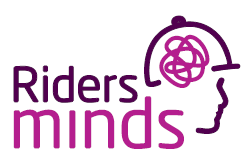
HOW TO HAVE COURAGEOUS CONVERSATIONS
Whether we recognise we’re struggling, or recognise someone else may be struggling, having a conversation might seem daunting, in any environment.
When it comes to riding and horse matters, riders will often talk to other riders, trainers, coaches, Chef d’Equipes, vets, owners and so on. For physical health matters, illnesses, or injuries, they’ll visit the doctor or appropriate professional. Yet, what about mental health matters? Riders might struggle with, say, competition anxiety, feeling low after unexpected poor results, performance expectations, lost confidence after a fall or in general.
Other matters, riding or equestrian related or not, such as life events, personal and/or professional matters, work, business, career, financials, loss of some kind (including that of four-legged friends), relationships, friendships, supporting someone who’s struggling with their mental health, bullying, can affect well-being and be difficult conversations to have too.
However, left unaddressed, our mental health could deteriorate.
The ripple effect could impact physical health, family, friends, horses, other riders, work, business and personal/professional reputations too. It can also affect our ability to support others, or be that “go to” person. Others may avoid, isolate or not want to ride with you, have a negative impression of you. Team selectors may overlook you. Owners may take their horses away. You might get bad press, or be trolled on social media.
Rather than struggling, suffering in silence, getting stressed or risking others misunderstanding you from, say, behavioural changes, it makes sense to have ‘that’ conversation. The same applies if you see someone else struggling too. There’s no right or wrong way to have a courageous conversation, but read on for our top tips.
IF YOU ARE STRUGGLING
Being honest with ourselves when we’re not our ‘normal’ self, is a huge step forward. Things may be going on in our personal or professional lives, equestrian or not.
Someone may have said something about us, or a comment has us thinking. Someone’s behaviour or attitude is affecting us. We may feel bullied, discriminated or compromised. We may have ‘difficult’ clients. We may be struggling with supporting someone else who is struggling.

Regardless of cause, our riding, success, enjoyment and pleasure can be affected, let alone our businesses.
We’re all being encouraged to talk about mental health matters. Yet, our well-being, physical or mental health, is still a private matter for many. We may self-help, or seek help, support and manage the recovery, or ongoing condition, with help from medical professional(s).
Sharing with others often means better understanding, support, lessens rumours, gossip, bad feelings etc, so in many circumstances it’s appropriate, even necessary. For example, professional riders having conversations with other riders, employers, trainers, owners, sponsors, backers, and grooms. Amateur and pleasure riders may need to speak to their employer.
Balancing sharing with privacy can be a dilemma. A helpful reminder is that this is about talking with someone, not talking with everyone about everything, and how much you share and who to, is also a matter of choice.
WHAT CAN I DO?
Have a courageous conversation with yourself. What’s going on? What/how do I feel? What do I need? What do I want or would like to have happen? What are my choices and actions? Who could I talk to? Would self-help, or life-style changes work?
Accept/admit help and/or support is needed. As you would for a physical health matter.
Remember privacy choices regarding how much or how little you share.
Take action, for example:
- Explore Riders Minds.
- Become better informed.
- Be courageous.
- Do something different. If you do what you’ve always done, you’ll get what you’ve always got!
- Try out some self-help tools; make life-style changes.
- If you work, check for organisational support, its accessibility and availability, EAP (employee assisted programmes), workplace adjustments etc.
- If a professional rider, check insurance. Do you have income protection? Is medical treatment, more specifically mental ill health, or long-term sick covered?
- Speak to someone. Have a conversation. Informal or formal depending on who with, situation and environment.
- Make appointments if appropriate.
- Be mindful of what might happen if we do nothing
IF YOU SEE SOMEONE STRUGGLING
You may notice, sense or are concerned about someone. Perhaps a fellow rider, groom, an owner, or someone dear. You’ve ‘spotted’ they are, perhaps, behaving differently and not themselves. You want to do the right thing, but don’t know what to say, how to say it, do, or how to help. You may worry you’ll make things worse by raising it or saying the wrong thing. All too often nothing is said.
A recent campaign, encourages people to ‘Ask Twice’ if they suspect someone might be struggling with their mental health.The simple act of asking again, with interest, can help someone to open up for the first time.
RESEARCH SHOWS THAT
- Many with mental health issues want to keep in touch with family, friends and colleagues.
- Whilst many may find talking about poor mental health challenging, avoiding the subject is not helpful.
- Whilst many want to talk, they don’t for many reasons. By making the first move and asking how they are, an ‘it’s OK to talk’ environment is created and conversations are more likely.
Raising the subject of someone’s changed behaviour, performance, attitude or their well-being can be uncomfortable and awkward. However, understanding the ripple effect of poor or deteriorating mental health, conversations are place to start.
We have some informative FAQ’s to help you.
Choose a good time, location and situation. Trust your intuition to pick a good moment. Perhaps over a cup of tea, whilst riding, in the lorry, in the tack room. Make sure you’ve time and are fully present during the conversation, putting tech to one side. Cutting someone off when you’ve instigated the conversation is unhelpful.
‘Ask Twice’ – if you suspect someone might be struggling with their mental health. The simple act of asking again, with interest, can help someone open up, getting past the initial platitude of eg ‘I’m fine’.
Have a conversation. There’s no right or wrong. It’s a conversation. It might feel awkward or clunky because of the topic, but it’s still a conversation.
Signpost them to Riders Minds. Knowing this support exists boosts your confidence too to talk to another, because you can signpost them to get help. People are often capable of getting help, they just need to know how and where it is.
Speak from the I position. You then own your thoughts, actions, observations etc. This helps reduce the risk of conversations becoming negative when ‘you’ is used. For example ‘You did …./you are…’ can be perceived as accusatory, leading to defensiveness. So try these:
– What I’ve noticed lately is that… [you’re not your normal self; you seem…; you’re riding’s lost focus; you’re rushing the fences.]
– My experience of you recently is….[you’ve become rather touchy; a bit short tempered; a bit careless/forgetful…].
– I’ve observed ……[you seem quieter than usual; you’re spending a lot of time on your own, you don’t want to ride with us anymore].
Keep it light. People are often afraid to talk about mental ill-health because they don’t know what to say or how to express themselves. This approach benefits both. Your aim is to signpost to appropriate help, not probe, nor push them to share their story, nor find solutions.
Listening is one of, if not the most important thing you can do. IF they share their story, listen, however painful. Remain present, engaged and focused. This may be the first time someone’s listened.
Focus on action not their story helps you manage the listening better. You focus on signposting support rather than getting stuck in the story’s detail.
Respect they’ve trusted you. For someone to feel they can trust you with their story, is an accolade. Treat what they tell you with the utmost sensitivity, integrity and confidentiality; no gossiping or carelessly dismissing.
Talk about ‘normal’ stuff too. The horses, what they’re up to, news stories, competition results, horse magazine articles. Because they’re going, or have gone through, mental health issues doesn’t mean they’re no longer interested in others or other things. If they’re willing to, then engage with them on these levels. This often brings a sense of normality too and can pause, park their negative thoughts/emotions giving them valuable ‘breathing space’ for a while.
Mind what you say. Avoid things like ‘It’s all in your head’, ‘Other people have it worse’, ‘You’ve nothing to be depressed about’. If it was as simple as ‘thinking positively’, mental illness would be cured long ago! Accept too they may not know how they feel, unable to express or articulate it.
Look after yourself. Make sure you get the support you need.
Signpost them to Riders Minds anyway. You know then you’ve done the right thing and, you never know, they might just seek the support they need.
Remain available, supportive and ready should they change their mind and want to talk. You might feel frustrated, powerless but it’s important to accept their choice.
Keep in contact. Supportively check in with them from time to time. See how they’re getting on.
Better to act than ignore; better to say something than nothing – you may just be someone’s saviour.
IF SOMEONE SHARES THEY’RE STRUGGLING
How to deal with these situations? What to say, what to do? Feeling awkward or even wanting to escape is common.
However, such reactions are unhelpful and often detrimental to the person, reinforcing why they don’t talk.
Remember, it takes courage for someone to share their struggles.
Respect they’ve trusted you. Treat what they say with the utmost sensitivity, integrity, privacy and confidentiality; no gossiping or carelessly dismissing.
Be human. No special training is required to show compassion and care.
Give them your time. Might be awkward timing for you but language such as ‘I’m busy at the moment’, ‘I can’t talk right now’ can seem dismissive and be detrimental to the person (who’s trusted you). No clock watching either. If you really need to, set a later time to talk and stick to it.
Listen and listening is often enough. Remain present, engaged and focused throughout. This may be the first time they’ve been heard.
Mind what you say. ‘It’s all in your head’, ‘Other people have it worse’, ‘that’s ridiculous’, ‘You’ve nothing to be depressed about’, are unhelpful.
Keep it light/focus on action. Your focus is to listen, give them time and then signpost to appropriate help. It’s not to rush, probe, get stuck or explore their story if they share it. Nor fix or find solutions.
Body language and voice. Be very aware of this while speaking with someone. Conveying negative vibes, body or voice language to someone who’s trusted you, risks shutting them down with potentially huge detrimental effect. Remain open, engaged, warm, maintain soft eye contact and pay attention. If they get emotional, remain present, and wait patiently for them to compose themselves and continue.
Signpost them to Riders Minds for further support, particularly the Get Support section.
Keep in touch. Supportively check in with them from time to time. See how they’re getting on.
Talk about ‘normal’ stuff too. The horses, what they’re up to, news stories, competition results, horse magazine articles. This often brings a sense of normality, emphasising that it was OK to talk.
WHAT ABOUT NOT BEING FACE TO FACE?
This brings its own challenges. However you can still ‘spot’ signs of change:
- In telephone calls, by paying attention to the voice; its physical and emotional characteristics. Eg tone, pitch, volume, intonation, language used, or breathing, sighing, shortness of breath, weeping, silence. We ‘hear’ emotions eg frustration, anger, sadness, joy, excitement, anxiety, in someone’s voice.
- In text, emails by paying attention to the words used, phraseology, meaning or tone. We can ‘sense’ emotion in the written word.
- In social media. Videos, pictures and written posts are further clues to someone’s well-being and mindset, what they tell us and what they’re not telling us too. In videos, we might notice uncharacteristic changes in a horse’s performance or way of going which could be saying something about the rider, or we might notice similar about the rider too. Eg. a riders’ riding demeanour has changed; they appear tense, or floppy, frustrated or ambivalent.
CHANGING THE NARRATIVE
In 2024 the theme for World Suicide Prevention Day was “changing the narrative around suicide“. We understand that it can be difficult to talk about suicide, which is why we have shared a conversation guide from Mental Health UK.

Image from Mental Health UK, the hi-res version can be found here: https://euc7zxtct58.exactdn.com/wp-content/uploads/2021/09/09112308/Mental-Health-UK-Conversation-Guide-Talking-About-Suicide.pdf


